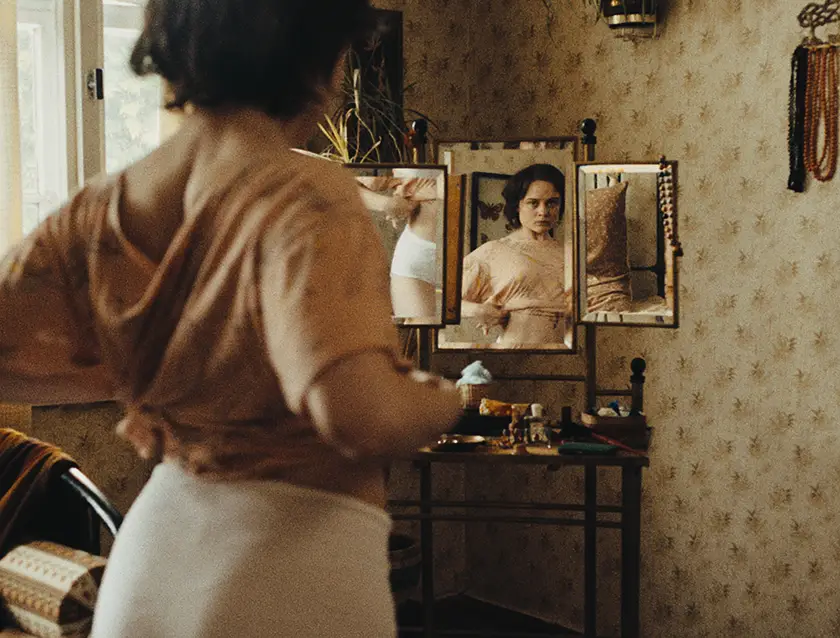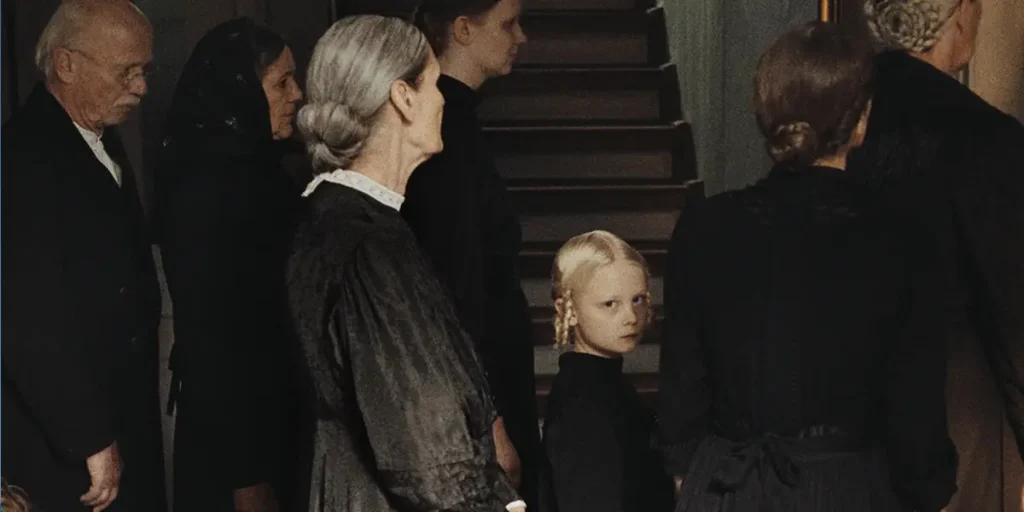With her uber-confident second feature film Sound of Falling, director Mascha Schilinski artfully dissects the 20th century in Germany.
Director: Mascha Schilinski
Genre: Drama
Run Time: 149′
Original Title: In die Sonne schauen
Cannes Premiere: May 14-16, 2025
U.S. Release Date: November 14, 2025 (limited) / January 16, 2026 (wide) in theaters
U.K. & Ireland Release Date: March 6, 2026 in cinemas
The title Sound of Falling is not a metaphor. Every now and then in Mascha Schilinski’s breathtakingly assured second feature, the sounds in a scene are subsumed by an increasingly violent rumbling, and it’s usually accompanied by a stare from a young woman, breaking the fourth wall to stare into your soul because her own soul has been so badly withered. This epic story charts life across four generations; while those lives are lived in very different circumstances, they are united by the house they call home, and the too-human horrors that seem to emanate from it.
Sound of Falling opens on Erika (Lea Drinda) hobbling down a hallway in her family home with a pair of crutches. Luckily, the leg she appears to be missing is revealed to be intact, and the crutches belong to her amputee uncle Fritz (Martin Rother). Schilinski lets us imagine Fritz lost the leg in the war (Either one), and lets Erika develop a quasi-erotic fascination with her uncle, but before either thought can go too far, she is summoned outside by her father to feed the pigs. Attempting to explain her tardiness, he strikes her hard enough to turn her face to the camera, and the first rumblings begin. This is not the last time that we will hear a character’s shame rumble from the depths of their being, while they pleadingly stare us down.
Being a localised exploration of German political strife in utero, Sound of Falling will inevitably be compared to The White Ribbon, Michael Haneke’s portrait of the birth of the resentments that would lead to World War II, told from the point of view of a village in the late 1910s. Sound of Falling is at once a deeper and wider probe. Centering on one farmhouse in Saxony-Anhalt in Germany’s north-east, Schilinski finds family more useful than broader society to make her point. The same sins and virtues can be found in this smaller representative sample of the population, and the common bonds of the generations that emerge from this house allow those sins to be tracked over time. Between the early 1900s and the present day, fashions change, but guilt and repression stay the same. As one character describes it, these generations forgot how to laugh.

From Erika’s woes, we jump back to the early 1900s, where Erika’s ancestor Alma is attempting to find joy in a house that frowns on such frivolity. Alma is played by 8-year-old Hanna Heckt, and is in keeping with this year’s Cannes trend of extraordinary performances from children. Alma is easily the most lively member of this household, but unfortunately she doesn’t get to feel the same naïve happiness that little I-Jing does in Left-Handed Girl. Her family spends more time remembering the dead than keeping an eye on who’s alive. Perhaps if they did, they might have avoided the events that led to poor uncle Fritz (A younger version played by Filip Schnack) losing his leg. Schilinski’s camera and Alma are bonded by a shared curiosity, darting around the house and looking through peepholes at things they don’t understand. So many aspects of the stories in Sound of Falling are revealed in knowing glances and mournful heads hanging in shame.
The curiosity of the camerawork is also present in the edit. Sharing editing duties, Evelyn Rack and Billie Mind are tasked with ensuring the back-and-forth storytelling between the generations flows smoothly. It’s especially impressive that the stories intercut without overwhelming each other, while still maintaining the revelations of the plot for as long as possible. This also makes it sad to see that Erika’s sister Irm (Claudia Geisler-Bading) has grown up to inherit a world that’s as repressive as their father. In 1980s East Germany, Irm’s teenage daughter Angelika (Lena Urzendowsky) is seeking escape from her sexually abusive uncle (Konstantin Lindhorst), while maintaining mild flirtation with her sweet cousin Rainer (Florian Geißelmann).
In all these stories, parallels can be drawn between the abusers and the dominating jackboots of the day. However, Sound of Falling has little use for terms like ‘Nazi’ or ‘Stasi’; they’re too limiting. In Schilinski and Louise Peter’s script, the young women enduring all manner of emotional and/or physical abuse stand in for Germany herself. They can all claim ownership of the slowly aging farmhouse, but it’s of no use to them when all it offers is pain.
The decrepit nature of the farmhouse is reflected in Fabian Gamper’s cinematography. Shot in the Academy ratio, the film has a grainy texture, freezing the house in a time before slick digital images, and suggesting that it cannot evolve with the needs and whims of its inhabitants. The house is frozen right up to the present, as the house changes hands and new young inhabitant Lenka (Laeni Geiseler) makes friends with recently bereaved neighbour girl Kaya (Ninel Geiger). Even as these girls play innocently in a new united Germany, the look and sounds of the past hang over the film, as if to say even these cannot escape.
This is not to suggest Schilinski is incapable of offering her characters hope (In one scene, a character floats off the ground in a shot reminiscent of Malick’s The Tree of Life), but she’s pragmatic with them and her audience. She knows that guilt and the burden of sin will haunt them all, unless they can escape. It’s always there as a possibility, but she ensures we’re held rapt to the spot for as long as the characters stay in situ.
Sound of Falling: Movie Plot & Recap
Synopsis:
Though spaced over a century apart, several generations living in a German farmhouse experience shockingly similar expressions of violence and repression.
Pros:
- Mascha Schilinski shows incredible confidence in her complex tale, especially for just her second feature.
- The script is immensely intelligent, backed up by the cinematography, editing and sound design to convey its theme of cycles of abuse and the repetition of history
- The cast are superb, especially the younger actors.
Cons:
- Its necessarily repressive atmosphere and heavy themes will not be to all tastes.
Sound of Falling premiered at the Cannes Film Festival on May 14-16, 2025. The film will open in theaters in New York on January 16, 2025 and in Los Angeles on January 23, with a national rollout to follow. In the U.K. and Ireland, the movie will be released in cinemas on March 6.

